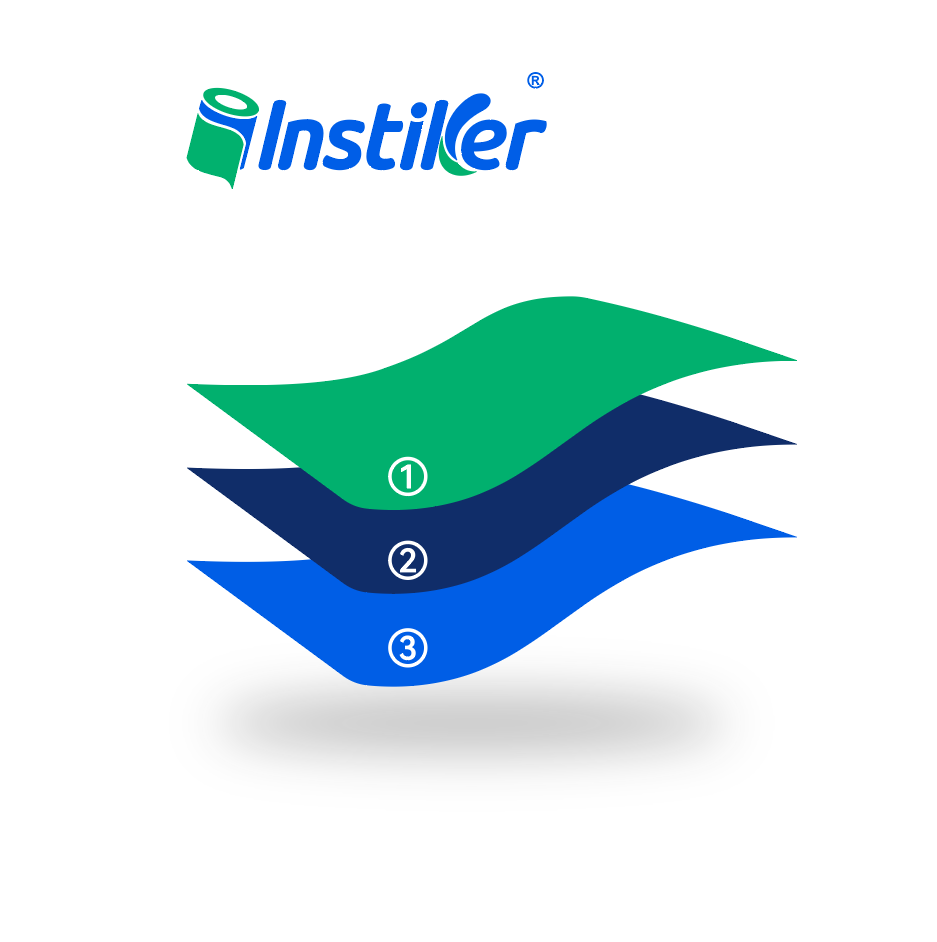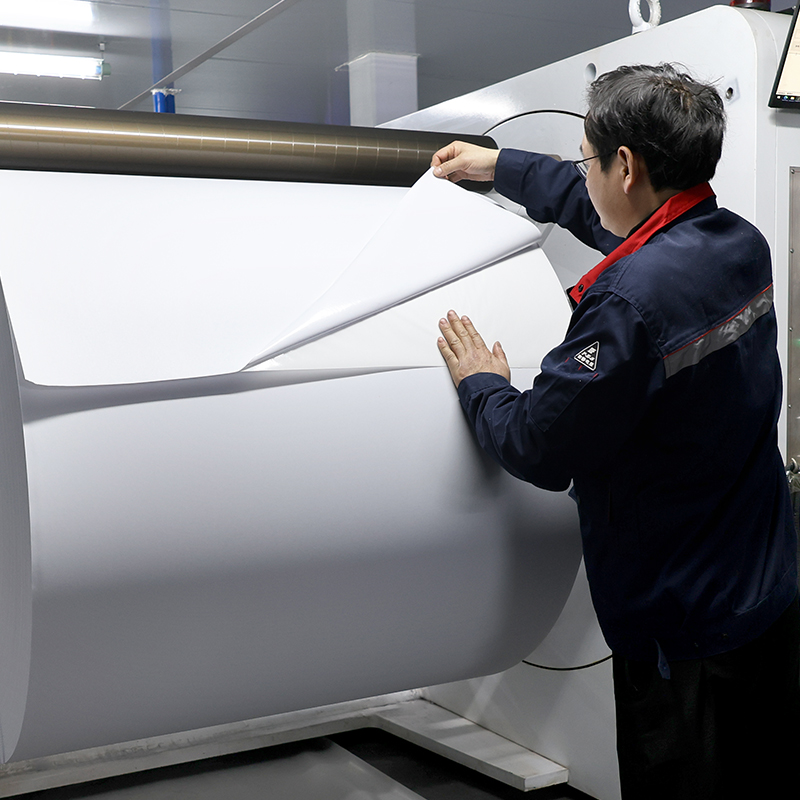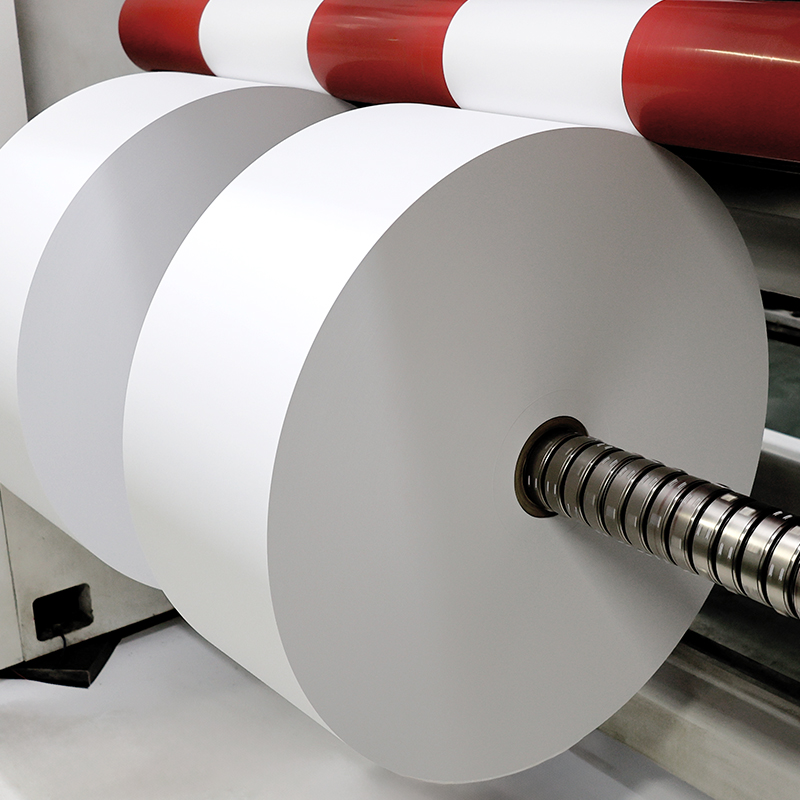












YH20456
Instiker
| Color: | |
|---|---|
| Size: | |
| Material: | |
| Application: | |
| Availability: | |
| Quantity: | |

Product Name: 54μ Matte White PP solvent 60g white glassine
1. Face Stock: Matte White PP
Caliper (μm): 52±5% GB/T 451.3-2003
Weight (g/㎡): 43±5% GB/T 451.2-2002
2. Adhesive Performance: Solvent
Initial Adhesion (N): 10.15 FTM 9
20 min.180'Peel Adhesion (N/25mm) : 13.75 FTM 1
20 min.90'Peel Adhesion (N/25mm): 12.87 FTM 2
Storage Temperature: -15°C to 80°C
Minimum Lakelling Temperature: 10°C
3. Liner: White Glassine
Caliper (μm): 52±5% GB/T 451.3-2003
Weight (g/㎡): 60±5% GB/T 451.3-2003
It can be stored for 1 year at the temperature of 23+2°C and relative humidity of 50+5%
It is widely used in bar code printing and normal printing, die-cutting performance is excel-White Glassine lent. Excellent performance on many packaging materials.
It is widely used in various printing processes. Attention should be paid to controlling the viscosity of the ink to avoid the loss of the coating caused by over-viscous ink. Avoid exces-sive rewinding tension, which may cause label glue overflow. Simple text printing and bar code printing are recommended.
This product is PP with matte coating. It can be used for general daily chemicals and beverage labels. It is economical and practical. It can be used for barcode printing and has strong adaptability to various packaging.
Q: Is this label fully recyclable?
A: Yes, the synthetic face stock and recycled kraft liner are both recyclable in plastic and paper streams, respectively. Remove adhesive residue before recycling.
Q: Can it be composted?
A: The face stock and adhesive are certified for industrial composting (OK Compost Industrial), breaking down into organic matter within 12 weeks under controlled conditions.
Q: How does it compare to traditional paper labels in wet environments?
A: The synthetic fibers repel water, making it 300% more moisture-resistant than kraft or paper labels, ideal for refrigerated or outdoor applications.
Q: Does the eco-friendly adhesive affect bonding strength?
A: No, the plant-based adhesive matches the performance of traditional acrylic adhesives, with a peel adhesion of 10N/25mm on stainless steel, ensuring reliable substrate bonding.



Product Name: 54μ Matte White PP solvent 60g white glassine
1. Face Stock: Matte White PP
Caliper (μm): 52±5% GB/T 451.3-2003
Weight (g/㎡): 43±5% GB/T 451.2-2002
2. Adhesive Performance: Solvent
Initial Adhesion (N): 10.15 FTM 9
20 min.180'Peel Adhesion (N/25mm) : 13.75 FTM 1
20 min.90'Peel Adhesion (N/25mm): 12.87 FTM 2
Storage Temperature: -15°C to 80°C
Minimum Lakelling Temperature: 10°C
3. Liner: White Glassine
Caliper (μm): 52±5% GB/T 451.3-2003
Weight (g/㎡): 60±5% GB/T 451.3-2003
It can be stored for 1 year at the temperature of 23+2°C and relative humidity of 50+5%
It is widely used in bar code printing and normal printing, die-cutting performance is excel-White Glassine lent. Excellent performance on many packaging materials.
It is widely used in various printing processes. Attention should be paid to controlling the viscosity of the ink to avoid the loss of the coating caused by over-viscous ink. Avoid exces-sive rewinding tension, which may cause label glue overflow. Simple text printing and bar code printing are recommended.
This product is PP with matte coating. It can be used for general daily chemicals and beverage labels. It is economical and practical. It can be used for barcode printing and has strong adaptability to various packaging.
Q: Is this label fully recyclable?
A: Yes, the synthetic face stock and recycled kraft liner are both recyclable in plastic and paper streams, respectively. Remove adhesive residue before recycling.
Q: Can it be composted?
A: The face stock and adhesive are certified for industrial composting (OK Compost Industrial), breaking down into organic matter within 12 weeks under controlled conditions.
Q: How does it compare to traditional paper labels in wet environments?
A: The synthetic fibers repel water, making it 300% more moisture-resistant than kraft or paper labels, ideal for refrigerated or outdoor applications.
Q: Does the eco-friendly adhesive affect bonding strength?
A: No, the plant-based adhesive matches the performance of traditional acrylic adhesives, with a peel adhesion of 10N/25mm on stainless steel, ensuring reliable substrate bonding.


Synthetic paper PP is a functional material mainly made of Polypropylene (PP for short) and processed through special techniques such as extrusion molding, calendering, and biaxial stretching. It simulates the appearance and some properties of traditional paper, but essentially it is a high-molecular plastic film. Therefore, it combines the durability of plastic and the printability of paper, and is an environmentally friendly alternative material.
Oil-based adhesive is a type of adhesive that uses oil-based solvents (such as toluene, xylene, etc.) as the dispersion medium. It is mainly made by dissolving synthetic rubber (such as chloroprene rubber, nitrile rubber, etc.) or natural rubber in organic solvents. Its essence is to cross-link and solidify rubber molecules through solvent evaporation, thereby achieving a bonding effect. It belongs to a type of traditional adhesive.
The 60g white glassine liner protects the acrylic adhesive during storage and transportation. Its smooth surface allows for easy release of the label, which is essential for efficient application in high - volume production settings.

Synthetic paper PP is a functional material mainly made of Polypropylene (PP for short) and processed through special techniques such as extrusion molding, calendering, and biaxial stretching. It simulates the appearance and some properties of traditional paper, but essentially it is a high-molecular plastic film. Therefore, it combines the durability of plastic and the printability of paper, and is an environmentally friendly alternative material.
Oil-based adhesive is a type of adhesive that uses oil-based solvents (such as toluene, xylene, etc.) as the dispersion medium. It is mainly made by dissolving synthetic rubber (such as chloroprene rubber, nitrile rubber, etc.) or natural rubber in organic solvents. Its essence is to cross-link and solidify rubber molecules through solvent evaporation, thereby achieving a bonding effect. It belongs to a type of traditional adhesive.
The 60g white glassine liner protects the acrylic adhesive during storage and transportation. Its smooth surface allows for easy release of the label, which is essential for efficient application in high - volume production settings.

UV ink and water-based ink are applicable. It can be used for letterpress, flexographic, screen printing, etc., but not for adhesive printing. Thermal transfer and resin ribbon printing are available. Ink and ribbon testing before printing is necessary. Avoid printing on the edge of the label, especially for screen UV ink and UV varnish. To ensure smooth processing, please use a sharp film-specific die-cutting knife, especially in flat-pressed die-cutting methods.
UV ink and water-based ink are applicable. It can be used for letterpress, flexographic, screen printing, etc., but not for adhesive printing. Thermal transfer and resin ribbon printing are available. Ink and ribbon testing before printing is necessary. Avoid printing on the edge of the label, especially for screen UV ink and UV varnish. To ensure smooth processing, please use a sharp film-specific die-cutting knife, especially in flat-pressed die-cutting methods.